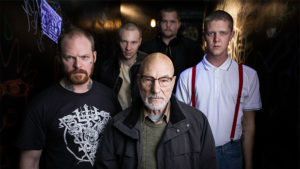 Review: Theatrical Run
Review: Theatrical Run
Green Room | Jeremy Saulnier | USA | 2015 | 95 minutes
Now playing at AMC Fitchburg 18»
Erik Oliver discusses the latest thriller from the director of Blue Ruin, Jeremy Saulnier, and argues that the violence in Green Room channels punk rock’s visceral intensity to fuse grindhouse sensibilities with formal rigor.
The subject of much discussion since its debut on the festival circuit last year, Jeremy Saulnier’s new Green Room lives up to the hype. It’s a perfect blend of grindhouse exhilaration and formal precision, extraordinarily raw yet tightly controlled. Blending brutal violence with razor-sharp, intelligent filmmaking, Green Room is must-see viewing—except, perhaps, for the squeamish.
Violence is a beloved, oft-used tool in cinema, and one that characterizes much of the medium’s voyeuristic allure. Looking across the history of its usage, it has always been used as a method of inflation. Its function can vary from allure to repellant, but it always carries a sense of spectacle. On-screen violence is an emotive device, one that consciously enhances whatever stakes the filmmaker wants to impart.
For Jeremy Saulnier, the director of 2014’s indie darling Blue Ruin, violence is truly senseless collateral. This idea may seem banal, considering that’s essentially the role of violence in your given summer blockbuster, but when we consider what it means in a small-scale thriller, the idea becomes truly novel.
Saulnier’s Green Room follows Blue Ruin’s thematic footprints and indeed foregrounds them, establishing a cast of characters who can, at any moment, be killed gruesomely. Blue Ruin portrays violence as simultaneously meaningless and something its characters can never escape because they see in it a weight that doesn’t exist. But none of them will be lingered over; once someone is gone they’re gone, and there’s more to deal with coming.
Green Room is as explicitly violent a wide-release movie as you’ll find these days, but it’s also not exactly one for the gorehounds. The violence is quick, brutal, and often over before you even notice what’s happening—much like it is in real life. Green Room hails from a long lineage of exploitation flicks, and it’s willing to get nasty, but it never loses its tight control on violence as thematic force in favor of simple thrills.
The exceedingly simple and extraordinarily effective plot is essentially a siege thriller along the lines of Assault on Precinct 13. The Ain’t Rights, a punk band led by Pat (Anton Yelchin), are low on cash and increasingly desperate for ways to fuel their van as they travel on tour through the Pacific Northwest. Sick of fetching single-digit door prices at small-time gigs, they accept a spot on a show at an isolated skinhead joint run by neo-Nazis with significant dedication to their cause. The band plays their set, narrowly avoiding a confrontation after they regale the white supremacists with a cover of the Dead Kennedys’ “Nazi Punks Fuck Off.”
 Before they can leave, Pat discovers a grisly murder in the titular waiting room. The operators of the establishment lock the band inside, call the owner, Darcy (a chillingly to-type/against-type Patrick Stewart), and face a choice: trust the kids to keep their mouths shut, or resort to silencing them permanently. The band remains uncertain of exactly how much trouble they’re in, and Darcy’s army of skinheads deliberate over what actions to take.
Before they can leave, Pat discovers a grisly murder in the titular waiting room. The operators of the establishment lock the band inside, call the owner, Darcy (a chillingly to-type/against-type Patrick Stewart), and face a choice: trust the kids to keep their mouths shut, or resort to silencing them permanently. The band remains uncertain of exactly how much trouble they’re in, and Darcy’s army of skinheads deliberate over what actions to take.
While Green Room has been billed as a no-holds-barred siege thriller, it also excels as a pressure-cooker for a significant portion of its runtime. Saulnier perfectly captures the uncertainty of its situation, making us as uneasy as its characters as to where, exactly, it’s going. Saulnier’s themes of inevitability and finality take form in this part of the movie, where it sketches in its characters with light but clever touches, and makes us root for them to make it out, even as we’re increasingly sure they won’t. It’s unclear whether violence could ever be averted in this scenario, but the movie takes its time tightening the screws until it bursts open and explodes in a breathless flurry of adrenaline and violence.
That gore provides a showcase for Saulnier’s technical mastery. He likes to time his cuts just slightly before you expect them in traditional editing rhythms, so many of the most grotesque images come and go too quickly for you to respond before they’ve seared themselves into your brain. Sean Porter’s excellent cinematography finds just enough compositional beauty to keep the film’s grungy palette fresh. Green Room rides its audience sympathies hard, with a genuine ruthlessness towards its characters, but it also finds ways to keep the whole thing fun with smart character beats and an acerbic wit throughout.
A strong cast imbues their roles with humanity despite not having many showcase moments. Standouts Yelchin and Imogen Poots effectively convey exhaustion and increasingly nihilistic humor. Yelchin delivers the exact type of realistic breakdowns a real person would in this type of situation, as Pat tries and repeatedly fails to put on a brave face. Poots exudes a slightly sickly but vital charisma as Amber, a friend of the murder victim.
Patrick Stewart delivers a fantastic and understated performance as Darcy, subverting his authoritarian persona to terrifying effect, and serves his role perfectly without ever overshadowing the movie’s goals. Without a committed cast this movie likely wouldn’t work, but within the tight framework of Green Room the cast makes their characters lived-in and likable, and vulnerable as any of us would be.
Green Room has big ideas on its mind, but it mostly keeps them in the background—some might say too much, considering its willingness to use white supremacists as antagonists while almost never addressing their actual ideology. Yet as a self-contained capsule—a brilliant exercise of craft and a brutal, adrenaline-pumping rush—it’s nearly perfect, a thriller with arthouse construction and a raging punk heart.
Early in the film, Yelchin’s Pat explains the band’s lack of media presence, arguing for the vital immediacy of punk music as a means of expression. Green Room takes this argument to its extreme, channeling in visceral intensity and an attention to the moment as life-changer: within a moment, a friend can be dead, or an enemy can have a change of mind. A great set in a skinhead joint can pacify polar opponents; but only until the music ends, and all that’s left is the bloody aftermath.
Note: Green Room will continue at AMC Fitchburg 18 after Friday, May 20, but will be limited to one screening per day, 1:20pm.